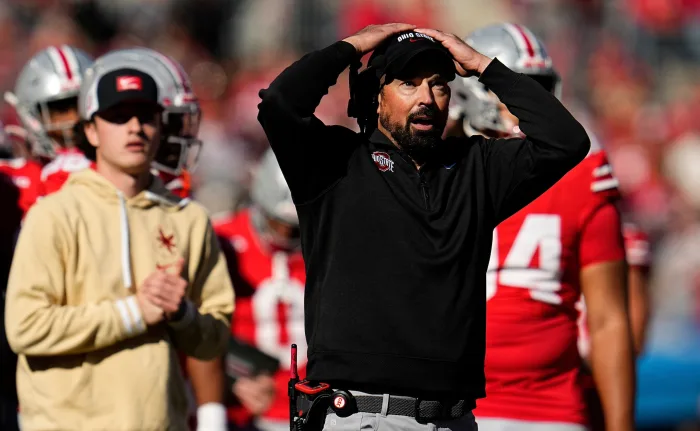The 2024 college football season has been rife with debates over controversial officiating calls, and one of the most notable incidents has involved the Ohio State Buckeyes. A national media outlet recently claimed that the Buckeyes were victims of one of the worst officiating calls of the season, a statement that has sparked significant discussion across the college football landscape. While officiating mistakes are a common part of the game, this particular call has left many fans, players, and analysts questioning the accuracy and consistency of referees in crucial moments of the season.
The Ohio State vs. Nebraska Game: A Controversial Night
On October 26, 2024, Ohio State faced off against Nebraska in a Big Ten matchup that had huge implications for both teams. The Buckeyes were looking to extend their winning streak and solidify their position in the playoff race, while Nebraska hoped to pull off a major upset. However, what should have been a pivotal game for both teams ended up being overshadowed by a series of questionable officiating decisions, with the most glaring mistake occurring in the second half.
The controversial call came during a critical drive for Nebraska, as they were trying to push forward on offense. On a key third down, Nebraska running back Dante Dowdell appeared to have gained enough yardage for a first down. The play was a hard-fought run that saw Dowdell push through the Buckeye defenders, seemingly crossing the first-down marker. However, the officials marked the ball well short of the line to gain, leading to a decision that would eventually be reviewed.
The Spot That Changed Everything
The controversial spot of the ball sparked an immediate outcry from Ohio State players and coaches, who believed that Dowdell had clearly crossed the first-down line. Onlookers in the stadium and viewers at home were left baffled as the officials refused to overturn the spot despite what appeared to be obvious evidence that Nebraska had gained the first down. The situation escalated when Nebraska used a timeout to avoid a potential delay of game penalty, giving coaches and players a moment to process the botched call.
Eventually, the Big Ten Conference acknowledged the mistake. They admitted that the spot had been incorrectly marked, and that Nebraska should have been awarded the first down. However, this acknowledgment came after the game was over, and the damage had already been done. The misspot had altered the flow of the game and put the Buckeyes in a difficult position. It was clear to many that this call could have had a lasting impact on the outcome of the game, even if Ohio State went on to secure the victory.
The Arvell Reese Targeting Ejection
The officiating controversy didn’t stop with the botched spot on the field. In another pivotal moment, Ohio State linebacker Arvell Reese was ejected from the game after being called for targeting on a hit he made on Nebraska wide receiver Jahmal Banks. The play occurred in the middle of the third quarter when Reese delivered a hit that some believed was perfectly legal. While the officials initially threw the flag for targeting, many observers — including analysts and fans — were left questioning whether the penalty was warranted.
Targeting penalties in college football are serious offenses that can result in an automatic ejection, and it’s crucial that the officials get these calls right. In Reese’s case, there was immediate concern among Ohio State fans and players that the call was too harsh and unjustified. After reviewing the play, it became clear that the hit wasn’t as egregious as the officials had initially believed.
A statement from the Big Ten Conference later confirmed that the targeting call on Reese had been a mistake. The league admitted that Reese’s hit did not meet the criteria for targeting and that he should not have been ejected from the game. This was a rare instance where the conference publicly acknowledged an error in officiating, though it did little to undo the impact of the call on Ohio State. The Buckeyes were forced to play without one of their key defenders for the remainder of the game, which affected their defensive performance.
National Media Reactions: A Historic Blunder
The officiating errors in the Ohio State vs. Nebraska game quickly caught the attention of national media outlets. ESPN, CBS Sports, and others weighed in, highlighting the controversy and questioning the overall consistency of college football officiating. On3 Sports expert Pete Nakos called the targeting penalty on Arvell Reese one of the “worst officiating calls” of the 2024 college football season, further fueling the discussion around the mistakes.
The focus of these national outlets was not just on the specific calls but on how such blunders have become an unfortunate trend in college football. Officiating in college sports has long been a subject of debate, with fans and analysts frequently criticizing the inconsistency of calls, especially in high-stakes games. In the case of Ohio State vs. Nebraska, both the spot and the targeting ejection were seen as prime examples of the difficulties that officials face in getting crucial calls right.
Some outlets have even pointed out that these kinds of errors can have a major impact on the playoff race and overall rankings. For Ohio State, a win over Nebraska was essential in maintaining their position as a playoff contender. With the Big Ten Championship on the line, every game and every call matters — and the perceived injustices in this game raised questions about the integrity of the sport.
The Bigger Picture: Why Officiating Needs Improvement
The controversies surrounding the Ohio State vs. Nebraska game have brought to light the larger issue of officiating in college football. While most fans understand that referees are human and can make mistakes, the increasing frequency of high-profile blunders raises concerns about the future of the game. In the case of the Buckeyes, the controversial calls were particularly damaging because they occurred in such critical moments of the game.
One of the most significant issues with the current system is the lack of accountability for referees. In professional sports, officials are often scrutinized in real-time, with penalties and errors being evaluated by independent bodies or leagues. In college football, however, while conferences like the Big Ten may release statements acknowledging mistakes, there is little consequence for officials who make such egregious errors. Some have called for more transparency and accountability, particularly when mistakes are made in high-stakes games.
Additionally, the consistency of targeting calls remains a major concern. The targeting rule in college football is one of the most controversial aspects of the game. While it is meant to protect players from dangerous hits, the subjective nature of the rule often leads to inconsistent calls, leaving players and coaches frustrated. The ejection of players, particularly when the call is later reversed, serves as a reminder that more needs to be done to improve the process and ensure that penalties are enforced fairly.
Looking Ahead: What’s Next for Ohio State and College Football Officiating
As Ohio State moves forward from their controversial victory over Nebraska, the team will be looking to ensure that their playoff hopes remain intact. While the calls in the Nebraska game were frustrating, the Buckeyes can only control their performance on the field moving forward. However, they will likely continue to speak out about the importance of improved officiating, as this has become a more prominent issue for teams across the country.
The Big Ten Conference, as well as other college football organizations, will likely face increased pressure to make changes to the officiating process. The goal is to reduce errors and increase the consistency and fairness of calls, particularly in key games. Fans and analysts alike are calling for more comprehensive reviews and improved training for officials to ensure that critical decisions don’t negatively impact the outcome of games.
In conclusion, while Ohio State may have been the victim of one of the worst officiating calls of the 2024 season, the bigger issue remains the need for better officiating across college football. It is crucial that the sport works toward creating a system where officials can be held accountable and where consistency in calls becomes the norm rather than the exception. Only then can college football move toward a more fair and transparent future.



